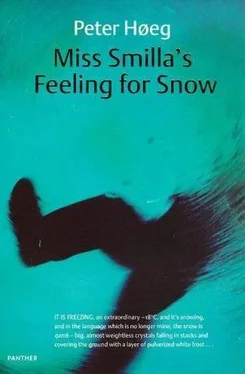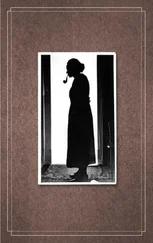Peter Høeg - Smilla's Sense of Snow aka Miss Smilla's Feeling for Snow
Здесь есть возможность читать онлайн «Peter Høeg - Smilla's Sense of Snow aka Miss Smilla's Feeling for Snow» весь текст электронной книги совершенно бесплатно (целиком полную версию без сокращений). В некоторых случаях можно слушать аудио, скачать через торрент в формате fb2 и присутствует краткое содержание. Жанр: Современная проза, на английском языке. Описание произведения, (предисловие) а так же отзывы посетителей доступны на портале библиотеки ЛибКат.
- Название:Smilla's Sense of Snow aka Miss Smilla's Feeling for Snow
- Автор:
- Жанр:
- Год:неизвестен
- ISBN:нет данных
- Рейтинг книги:3 / 5. Голосов: 1
-
Избранное:Добавить в избранное
- Отзывы:
-
Ваша оценка:
- 60
- 1
- 2
- 3
- 4
- 5
Smilla's Sense of Snow aka Miss Smilla's Feeling for Snow: краткое содержание, описание и аннотация
Предлагаем к чтению аннотацию, описание, краткое содержание или предисловие (зависит от того, что написал сам автор книги «Smilla's Sense of Snow aka Miss Smilla's Feeling for Snow»). Если вы не нашли необходимую информацию о книге — напишите в комментариях, мы постараемся отыскать её.
Smilla's Sense of Snow aka Miss Smilla's Feeling for Snow — читать онлайн бесплатно полную книгу (весь текст) целиком
Ниже представлен текст книги, разбитый по страницам. Система сохранения места последней прочитанной страницы, позволяет с удобством читать онлайн бесплатно книгу «Smilla's Sense of Snow aka Miss Smilla's Feeling for Snow», без необходимости каждый раз заново искать на чём Вы остановились. Поставьте закладку, и сможете в любой момент перейти на страницу, на которой закончили чтение.
Интервал:
Закладка:
There are people in Greenland who have a way with dogs. My mother did. Before nylon ropes became common in the seventies, we used harnesses made of sealskin as towlines. The other dog teams chewed through their harnesses. Our dogs didn't touch theirs. My mother had forbidden it.
Then there are those born with a fear of dogs who never overcome it. I'm one of those people. So I walk back along Strand Boulevard and take a cab home.
I don't go up to my apartment. I go to Juliane's. I take a pound of cod liver out of her refrigerator. Her friend at the fish market gives her free liver if it's split. In her bathroom I pour half a bottle of Halcion pills into my pocket. Her doctor prescribed them for her recently. She sells them. Halcion is marketable among junkies. She uses the money to buy her own medicine, the kind that customs officers charge duty on.
In Rink's collection there is a story from West Greenland about a bogeyman who can't fall asleep but must keep watch for all eternity. But that's because he hasn't tried Halcion. When you take it for the first time, half a tablet can put you into a deep coma.
Juliane lets me forage: She has given up on almost everything, including asking me questions.
"You've forgotten me!" she shouts after me.
I take a taxi back to Kalkbrænderi Road. The cab starts to smell like fish.
Standing beneath the streetlight under the viaduct facing the Free Harbor, I crush the pills into the liver. Now I smell like fish, too.
This time I don't have to call the dog. He's standing there waiting, hoping that I would come back. I toss the liver over the fence. You hear so much about dogs' keen sense of smell, I'm afraid he might smell the pills. My worries are for naught. The dog sucks up the liver like a vacuum cleaner.
Then we wait, the dog and I. The dog is waiting for more liver. I am waiting to see what the pharmaceutical industry can do for sleepless animals.
A car pulls up. A station wagon from Danish Watchdogs. There's no place to make yourself invisible or even discreet on Kalkbrænderi Road. So I just stand there. A man wearing a uniform gets out of the car. He looks me over but can't come up with a satisfactory explanation. Solitary woman wearing a fur coat at one in the morning on the outskirts of the Østerbro district? He unlocks the gate and puts the dog on a leash. He brings him out to the sidewalk. The dog growls nastily at me. Suddenly his legs turn to rubber and he's about to fall over. The man stares at the dog anxiously. The dog looks at him mournfully.
The man opens the back of the wagon. The dog manages to get his front paws in, but the man has to shove him the rest of the way. He's mystified. Then he drives off. Leaving me to my own thoughts about the way Danish Watchdogs works. I come to the conclusion that they put the dogs out as a kind of random sampling, every once in a while, and for only a short time at each place. Now the dog's on his way to the next place. I hope there's something soft for him to sleep on.
Then I stick the key in the lock. But it doesn't open the gate. I can just picture it. Elsa Lübing has always arrived at work at a time when a guard opened the gate. That's why she didn't know that the entrances on the outer periphery are on a different key system.
I'll have to go over the fence. It takes a long time. I end up throwing my boots over first. A piece of sealskin gets caught in the process.
I only have to look at a map once and the landscape rises up from the paper. It's not something that I learned. Although, of course, I had to acquire a nomenclature, a system of symbols. The ridged elevation peaks on the topographical maps of the Geodesic Institute. The red and green parabolas on the military maps of the ice pack. The discus-shaped, grayish-white photographs of X-band radar. The multi-spectrum scans of LANDSAT 3. The candy-colored sediment maps of the geologists. The red-and-blue thermal photographs. But in the truest sense it has been like learning a new alphabet. Which you then forget about as soon as you start reading. The text about ice.
There was a map of the Cryolite Corporation of Denmark in the book at the Geological Institute. A cadastral map, an aerial photograph, and a floor plan. Now, standing on the grounds, I know how it all once looked.
It's a demolition site now. Dark as a cave, with white spots where the snow has been blown into drifts.
I've entered the grounds where the rear of the raw cryolite building once stood. The foundation is still there.
An abandoned soccer field of frozen concrete. I look for the railroad tracks, and at that very moment stumble over the ties. The tracks of the train that brought the ore in from the company's dock. Silhouetted in the darkness is the workers' shed where the smithy, the machine shop, and the carpentry shop once were housed. A cellar full of bricks was once the basement under the cafeteria. The factory grounds are bisected by Svaneke Street. On the other side of the road is the residential district with lots of electric Christmas stars, lots of candles, and all those nuclear families. And outside their windows: the two rectangular laboratory buildings which haven't been torn down yet. Is this a portrait of Denmark's relationship to its former colony? Disillusionment, resignation, and retreat? While retaining the last administrative grip: control of foreign policy, mineral rights, and military interests?
In front of me, against the light from Strand Boulevard, the building looks like a small castle.
It's an L-shaped building. The entrance is at the top of a fan-shaped, granite staircase, in the wing facing Strand Boulevard. This time the key works.
The door opens onto a small square foyer with black and white marble tiles and acoustics that reverberate, no matter how quietly you move. From here one stairway leads down to the darkness and the archives below, and another goes five steps up to the floor where Elsa Lübing, for forty-five years, has exerted her influence.
The stairs lead up to some French doors. Beyond them is one large room, which must run the full length of the wing. There are eight desks, six bay windows facing the street, file cabinets, telephones, word processors, two copy machines, metal shelves with red and blue plastic file folders. On one wall a map of Greenland. On a long table a coffee machine and several mugs. In the corner a big electronic safe with a little window glowing with the word CLOSED.
One desk is set apart from the others and slightly larger. It has plate glass on top. On the glass stands a little crucifix. No private office for the Chief Accountant. Merely a desk in the regular pool. Just like in the first Christian congregation.
I sit down in her high-backed chair. In order to understand what it was like sitting here for forty-five years among the erasers and bank stationery, with part of her consciousness elevated to a spiritual dimension, where a light burns with a strength that makes her shrug cheerfully at earthly love-which for the rest of us is a mixture of the cathedral in Nuuk and the potential for a third world war.
After a moment I get up, none the wiser.
There are venetian blinds on the windows. The yellow light of Strand Boulevard is zebra-striped in the room. I punch in the date when she became Chief Accountant: QS-17-57.
The safe hums, and the door opens outward. There is no handle, only a wide ridge to take hold of and lean your weight against.
On the narrow metal shelves are the account books of the Cryolite Corporation since 1885, when it was separated from the Øresund Corporation by government charter. About six ledgers for each year. Hundreds of volumes in gray moleskin with red stamping. A piece of history. About the politically and economically most profitable and most important investments in Greenland.
Читать дальшеИнтервал:
Закладка:
Похожие книги на «Smilla's Sense of Snow aka Miss Smilla's Feeling for Snow»
Представляем Вашему вниманию похожие книги на «Smilla's Sense of Snow aka Miss Smilla's Feeling for Snow» списком для выбора. Мы отобрали схожую по названию и смыслу литературу в надежде предоставить читателям больше вариантов отыскать новые, интересные, ещё непрочитанные произведения.
Обсуждение, отзывы о книге «Smilla's Sense of Snow aka Miss Smilla's Feeling for Snow» и просто собственные мнения читателей. Оставьте ваши комментарии, напишите, что Вы думаете о произведении, его смысле или главных героях. Укажите что конкретно понравилось, а что нет, и почему Вы так считаете.




![Рута Шепетис - Ashes in the Snow [aka Between Shades of Gray]](/books/414915/ruta-shepetis-ashes-in-the-snow-aka-between-shades-thumb.webp)







